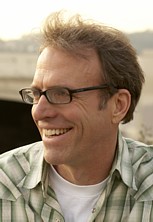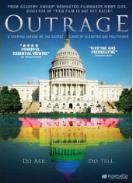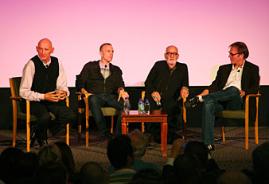
Kirby Dick, the DVD cover, post screening Q&A of the film at the Tribeca Film Festival with (L-R)
Rodger McFarlane, Michelangelo Signorile, Larry Kramer, Dick
Rodger McFarlane, Michelangelo Signorile, Larry Kramer, Dick
film from a queer perspective
Interview
| KATM media outlets |
| KATM featured weekly |
| Join Us! |
| KATM on RT |
| Vidcast Starring KATM |
| NOTE: THIS SITE ONLY LOADS CORRECTLY WITH EXPLORER AND MOZILLA BROWSERS - SORRY SAFARI USERS! |
| Buy the KATM Book |
Kirby Dick is Still Outraged
Expanded Edition of 2-10-10 WCT Interview
By Richard Knight, Jr.
Expanded Edition of 2-10-10 WCT Interview
By Richard Knight, Jr.
| Eight months after the May ’09 release of Outrage, his third documentary with prominent gay themes (Twist of Faith, This Film Is Not Yet Rated are the others), filmmaker Kirby Dick is still outraged. That's not just because the subjects of his latest film – ostensibly closeted politicians voting against their own kind, the shameful history of this practice and the question of outing itself – are still blithely moving forward, thanks to a pass seemingly given them by the mainstream media. Also because many in the mainstream media reacted to the film with kid gloves – going so far as refusing to reveal the names of some of those profiled in the documentary in their coverage (which seemed to reinforce the message of the movie). Then, just as Outrage was coming to DVD the media watchdog organization for our community, GLAAD, bypassed the film in its list of nominations for the year’s best documentary because they didn't want to “glorify a movie about people who run from who they are” – an oversight that quickly brought a disgruntled response from members of the LGBT media. Dick, who issued a statement countering GLAAD’s cagey explanation (which they then responded to), was ready to give Windy City Times in an exclusive interview, an update on that situation, the history of his passion for gay injustice (he’s straight), and a lot more. Excerpts: WINDY CITY TIMES (WCT): What’s up with this GLAAD situation? KIRBY DICK (KD): I was actually kind of hurt by that. I had interviewed Neil Giuliano the former Executive Director of GLAAD. He’s in the film and is very supportive of the film and makes some very strong arguments about the closet and GLAAD nominated This Film Is Not Yet Rated for a GLAAD award and I thought… WCT: A slam dunk, right? KD: Well not just a slam dunk but, “we’re fighting for the same cause here, side by side.” So I was just so surprised that they decided to not really even consider it. That was kind of a blow. I mean an award’s just an award but it felt like your friend didn’t invite you for dinner or something. WCT: And the response about why they didn’t consider it was so disingenuous. KD: Yes – if there ever was a film that was eligible this one met their criteria to a “T.” I think it was a number of things which I don’t want to speculate on too much. But certainly one of them, I’m sure, is that some people that were uncomfortable because there were obviously some gays and lesbians in the film that are not portrayed in a positive light because they shouldn’t be, of course. But on the other hand, too, this is all about the heroism and persistence of gay journalists and gay activists over the last two decades. This is really an untold story as far as the mainstream media is concerned and these people are heroes to me and to a lot of people. WCT: There was also this bizarre hesitancy on the part of the mainstream media to name names in the film when you did press for the film originally. I seem to recall that one of the reasons given was that your sources were not considered valid because their connection to the person in question was of a sexual nature. KD: Right. WCT: Do you want to talk a little about sourcing for the film? Was that problematic? KD: No, not really. I’m very confident, 100% confident in my sources. I think with the exception of perhaps Shepard Swift from Fox News, we met all the standards of having multiple sources – the appropriate journalistic standards. With Shepard Swift, true, it was only the editor of the Washington Blade but you’re taking an editor of a paper. I mean, I’m going to take his word for it. I don’t think there was any question about the film journalistically at all. I think it had much more to do with this issue of discomfort over reporting on this hypocrisy. It’s even addressed in the film. One of the people in the film made an interesting point – she was a commentator on CNN – I just can't remember her name at the moment. She made the comment that a lot of her straight friends make the mistake of not reporting on this kind of hypocrisy thinking they’re doing the gay and lesbian community a favor when in fact it’s just the opposite. For a number of reasons – one, if this hypocrisy is not reported on it continues and this is why it’s continued for decades because the mainstream press hasn’t reported on it and secondly, there’s this feeling that if you report that somebody might be gay or lesbian without them having come out themselves, that someone there’s something negative about that and you don’t want to harm those people so you don’t say it. The hidden message this carries is that there is something wrong about being gay. One of the indications that they’ll be 100% equality in this country is when every issue surrounding gays and lesbians – good and bad – is reported on in the same way that the straight issues are. WCT: It seemed like the mainstream media ignored many of the accusations made in the movie. I seem to recall Charlie Crist was in the news at that point but no one seemed to link him to the film. KD: Well, yes and no. One of the strategies of making this film was I felt that by making a high profile documentary the press was going to have to deal with this in a way that they had never dealt with it before. The reason was because the entertainment press would actually be less concerned about reporting on the names that were reported on in the film. It’s always the more political press that has been very careful on that side. In fact, that’s exactly what happened. The New York Times, the LA Times, the San Francisco Chronicle, I think ABC News at one point actually did report and name names but a there were a lot that didn’t – NPR, the Washington Post, etc. But that’s a breakthrough. I knew this whole issue of how the media covers this would be open for debate and NPR came through (laughs) with a shining example of being regressive on this issue. The great thing is that the NPR thing happened at such a perfect time. It just proved the argument about it in the film. The strategy worked to a fairly large degree. The other thing I have to say is that in doing interviews for the film the reporters themselves have really seen that it’s the right thing to do to report on this hypocrisy but the decisions are being made higher up the ladder that has prevented that from happening. WCT: Reporters said this to you as you did press for the film? KD: Yes they did. They would basically say, “The decision isn’t up to me” in such a way that I gleaned that if it was up to them they would report the names. “We’re reporting on a film that’s very well documented. In any other kind of situation we would report these names even if we wanted to qualify it by saying, ‘The film itself claims’” which is what they would do in any other film. So yes, in so many words they said that to me. WCT: Does this have to do with a comfort level? KD: Yes. WCT: It’s ironic – because I’m sure so many of these reporters probably think you’re a gay man. Obviously at some point you reached a comfort level with gay people. KD: Early on. My parents were always liberal. I wasn’t brought up with any kind of homophobia per se other than the homophobia that exists in society and certainly that was a part of me but when I was in high school my best friend came out to me and I’m actually very grateful for that experience. All the questions and issues that I might have or any residual homophobia was dealt with – oftentimes in very long conversations at night about everything. And then of course being in the arts, it’s just such a non-issue. WCT: Can we please talk about the late, great gay activist Rodger McFarlane who is prominent in the film and is beautifully memorialized in the DVD’s special features. I love the biographical section but even more the post Outrage screening Q&A he conducted with you and Larry Kramer and Michelangelo Signorile. KD: I remember saying goodbye to him and less than a week later he committed suicide. From everything that I can glean from that he was in real pain. From my perspective here’s a man who has lived his life exactly the way he wanted to so it’s no surprise to me that he chose to die in exactly the way he wanted to. It’s sad that he’s no longer around but in some ways I kind of admire the fact that he had control of his life and his death in a way. WCT: This is the third film that really touches on gay subject manner – why the passion for the subject? KD: My films seem to be all very different in a lot of ways and very eclectic and I never really had an answer when people would ask me what united them until this one when I realized that I am very interested in outsiders and the position of being an outsider. And I think hopefully that will change and change soon for gays and lesbians but I think there is an element of that – of seeing the world and experiencing it in a very profound way obviously very different than the mainstream. I think that's part of the reason. Secondly, I’ve always wanted to include sexuality in my films whenever and wherever possible. So, hey? (laughs) It’s right there. WCT: Well, sexuality is such a huge part of film which people overlook. You basically are sitting in a theatre objectifying somebody else in the dark. KD: Exactly – it’s an erotic experience. The audience is similar to a masochistic position or masochistic scene vis-á-vis the screen because they’re sitting in a chair and it’s dark and they’re sort of locked there and they have to sort of be submissive to whatever comes their way. It is an erotic situation and it’s no accident that sex and violence are an important part of any narrative structure including film. The other thing, too, is when you’re in the arts it seems like there’s this constant crossover between gay and straight sex. One quarter of the people in the arts are gay, maybe more? Whenever you’re talking to people you’re talking back and forth from these two different perspectives and try to kind of meld them and so I think that just seems like a natural thing to include. WCT: What would have been your Oscar speech if the film had been nominated? KD: I’d invite Larry Kramer – who I think is one of the great activists of the last hundred years – to come up in my place. He exemplifies what an activist is for me. WCT: What are you working on next Kirby? KD: I’m working on some pretty aggressive stuff but I can’t really talk about it because I don’t want them to get a heads up that I’m coming their way. WCT: Okay, good – go get ‘em! KD: Will do. (laughs) |






